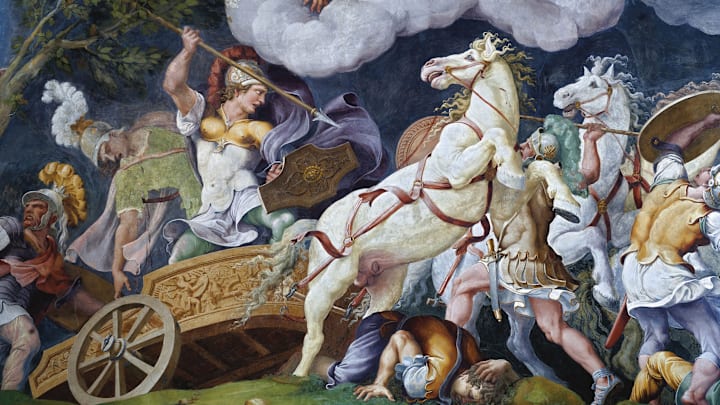Many of the idioms we use in everyday speech stem from strange, silly, or even grotesque roots. Here are eight examples.
“Bite the Dust“
The rock band Queen didn’t coin this phrase for their 1980 mega hit “Another One Bites the Dust.” Etymologists generally agree that this idiom stems from Samuel Butler's 19th-century translation of Homer’s The Iliad, which describes that “full many of his comrades may bite the dust as they fall dying round him.”

“Mad as a March Hare“
While this idiom is often used to refer to someone who is unhinged, bonkers, or even mentally unwell, its origin is a bit different, as it quite literally describes hares’ erratic behavior during the March breeding season. Among the earliest evidence of this saying dates back to 1385 from Geoffrey Chaucer in The Friar’s Tale, but it wasn’t widely known until it appeared in Lewis Carroll’s 1865 classic book Alice’s Adventures in Wonderland.
“Caught Red-Handed“
The meaning of this phrase isn’t a surprise—it means to catch someone with undisputable evidence (in this case, blood on their hands after murder or poaching). The unusual part of this idiom’s origin is its age: it traces back to 15th-century Scotland. The phrase “red hand” was used in official legal proceedings.

“On the Rack“
Now, we use this phrase to describe being under pressure, such as having a short deadline at work. Its origins are far more gruesome, as this idiom refers to the medieval torture device used to stretch victims’ bodies until their joints dislocated during interrogations.
“Kick the Bucket“
You may have heard that this one, commonly meaning “to die,” came from someone hanging themselves by standing on a bucket and then kicking it away—and this may be true. However, some theorize it stems from the yoke or pulley used to hang pigs by their feet for slaughter, while others connect its roots to West African languages.
“Pay Through the Nose“
The exact origin of this idiom is uncertain, but one theory ties it to a 9th-century tax imposed by Danes in Ireland, when those who failed to pay were punished by having their noses cut. Ouch!

“Spill the Beans“
The most likely origin is the ancient Greek process where people cast their vote using black or white beans. If spilled, the outcome would be revealed prematurely.
“Bury the Hatchet”
This odd way of saying “make peace” comes from an early indigenous North American ceremony—particularly among the Iroquois—where tribal adversaries literally buried weapons to signify the end of a conflict.
“Hands Down”
Used to mean won easily or without a challenge, this phrase comes straight from 19th-century horse racing. When a jockey gained a huge lead, they could relax and drop (“put down”) the reins (hands) and still win—hence “hands down.”
